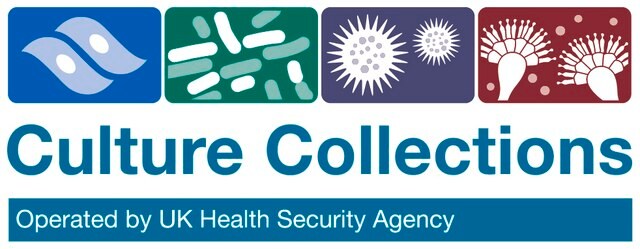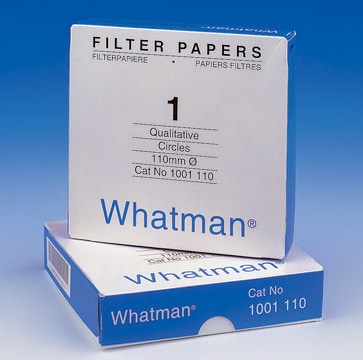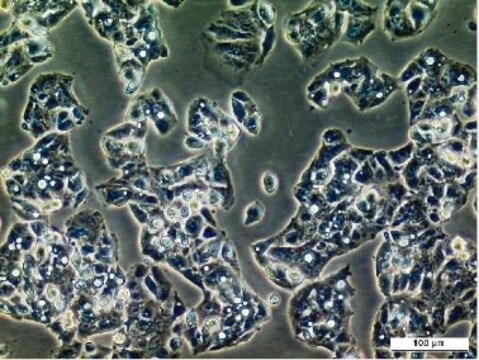推薦產品
product name
CACO-2 Cell Line human, from human colon(Caucasian colon adenocarcinoma), 86010202
生物源
human colon (Caucasian colon adenocarcinoma)
增長模式
Adherent
染色體組型
Hypertetraploid, modal no. 96
形態學
Epithelial
產品
Not specified
受體
Not specified
技術
cell culture | mammalian: suitable
相關疾病
cancer
運輸包裝
dry ice
儲存溫度
−196°C
一般說明
The CACO-2 cell line is a widely used in vitro model for mimicking the small intestine for drug transport studies. These cell lines form monolayers and are useful in intestinal permeation studies for screening excipients in drug formulations.
細胞系來源
Human Caucasian colon adenocarcinoma
細胞系描述
Isolated from a primary colonic tumour in a 72-year-old Caucasian male using the explant culture technique. Forms moderately well differentiated adenocarcinomas consistent with colonic primary grade II, in nude mice.
應用
CACO-2 Cell Line human has been used:
- to study if components of the sigma B regulon in Listeria monocytogenes contribute to cell invasion
- for functional analysis of bacteriocin divercin AS7
- to study the intracellular invasion by Listeria ivanovii
- to study the effect of Maslinic acid, a pentacyclic triterpene, on colon cancer cell lines
- in in vitro digestive enzymes toxicity studies
- for Hazara virus infection and cultivation
- to test the anti-cancer activity of the Curcuma longa and Origanum marjorana
- in biocompatibility studies with the bark extracts of Salix spp.
- to test the effect of N-3-oxo-dodecanoyl-homoserine (3O-C12-HSL) lactone from P.aeruginosa on the mitochondrial functionality
- to test the effect of elastin-like recombinamer (ELR) based nanoparticle
- as an in vitro epithelial cell model for studying the toxicity of zinc oxide nanoparticle
- in the intestinal permeability assays with green rooibos extract
- in toxicity studies with mycotoxin Deoxynivalenol (DON) cadmium (Cd)
DNA分析
STR-PCR Data: Amelogenin: X
CSF1PO: 11
D13S317: 11,13,14
D16S539: 12,13
D5S818: 12,13
D7S820: 11,12
THO1: 6
TPOX: 9,11
vWA: 16,18
CSF1PO: 11
D13S317: 11,13,14
D16S539: 12,13
D5S818: 12,13
D7S820: 11,12
THO1: 6
TPOX: 9,11
vWA: 16,18
培養基
EMEM (EBSS) + 2mM Glutamine + 1% Non Essential Amino Acids (NEAA) + 10% Foetal Bovine Serum FBS / FCS.
例行更新培養
Split sub-confluent cultures (70-80%) 1:3 to 1:6 i.e. seeding at 2-4x10,000 cells/cm2 using 0.25% Trypsinor Trypsin/EDTA; 5% CO2; 37°C. NB: During routine subculture the cells should always be subcultured before they achieve confluence. Cells may show the appearance of circular vacuoles in the cytoplasm. These may increase in frequency as the culture density increases to confluence. To reduce their frequency, media change confluent cultures after 2-3 days if not subcultured. Cells can clump if not separated into a single cell suspension when split.
其他說明
Additional freight & handling charges may be applicable for Asia-Pacific shipments. Please check with your local Customer Service representative for more information.
NaviCyte Scientific holds the exclusive commercial distribution rights to the CACO-2 cell line deposited by the Memorial Sloan-Kettering Cancer Center. Note: All uses of Catalogue Numbers 86010202 and 09042001, other than for research by a non-commercial or academic entity, require a license and use authorization from NaviCyte Scientific under its exclusive arrangement with Memorial Sloan-Kettering Cancer Center. For information on the licensing terms, please contact NaviCyte Scientific via contact@navicyte-scientific.com or (+1) 973-868-6100.
相關產品
產品號碼
描述
訂價
分析證明 (COA)
輸入產品批次/批號來搜索 分析證明 (COA)。在產品’s標籤上找到批次和批號,寫有 ‘Lot’或‘Batch’.。
文章
DNA, RNA, cDNA derived from ECACC mammalian cell lines allow screening for genes or expression patterns to identify lines most suitable for specific research.
我們的科學家團隊在所有研究領域都有豐富的經驗,包括生命科學、材料科學、化學合成、色譜、分析等.
聯絡技術服務





